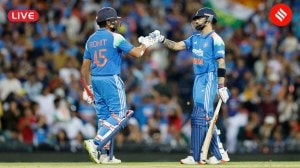What is the Chanda Kochhar case, and why has the CBI arrested her?
Chanda Kochhar, the former ICICI bank CEO-MD, and her husband, Deepak Kochhar, have been sent to three-day CBI custody in a loan fraud case. Do you know what the case is all about? We explain.
 Chanda Kochhar and her husband Deepak have been sent to CBI custody till December 26. (Express photo by Ganesh Shirsekar)
Chanda Kochhar and her husband Deepak have been sent to CBI custody till December 26. (Express photo by Ganesh Shirsekar) Former ICICI Bank CEO and MD Chanda Kochhar and her husband Deepak Kochhar were produced before the Mumbai special court by the CBI on Saturday, December 24. In a case related to alleged irregularities in loans provided to Venugopal Dhoot’s Videocon Group, the court granted the CBI custody of the couple till Monday (December 26). The couple was arrested on Friday.
The Indian Express takes a look at her story and how a Padma Bhushan awardee in 2011 ended up in prison in 2022.
The rise and fall of ICICI’s Chanda Kochhar
Chanda Kochhar joined ICICI Bank in 1984 and became its Managing Director (MD) and CEO in 2009. Breaking numerous glass ceilings for women in the banking sector along the way, she rose to the top on the back of her ability to make the most of emerging opportunities in newly liberalised India.
Beginning as a trainee, Kochhar’s rise through the ranks in ICICI bank mirrored the growth of a company from a small financial services institution to one of India’s largest lenders and a private financial behemoth that changed the face of banking in India. Through the early 2000s, Chanda Kochhar received various big projects as ICICI tried to set itself apart in a still nascent market.
Finally, in 2009, she beat several other contenders to get the Bank’s top job. Throughout her tenure, the defining feature of her leadership had been her control over the business and her attention to detail. She also meticulously curated a public image of herself. Chanda Kochhar was featured in Forbes International’s “The World’s 100 Most Powerful Women” list for seven consecutive years and was also named among TIME magazine’s “100 Most Influential People” in the world in 2015.
“She was the face of a movement that encouraged women entrepreneurs,” Gurcharan Das, author and former chief executive of Procter & Gamble India, had told the BBC in 2019.
She resigned from her position in 2018, after growing troubles in the company.
Conflict of interest
There had been murmurs about Kochhar’s conflict of interest as far back as 2016. However, it was only in 2018 that the story started getting traction.
While initially, ICICI’s board dismissed all the allegations against her, persistent media scrutiny and questions from investors forced the bank to set up an inquiry to investigate if the bank’s policies regarding conflict of interest and internal lending had been violated.
It was then that Chanda Kochhar finally resigned. However, to date, she and her husband have denied any wrongdoing.
The Videocon loans case
The allegation against Kochhar is simple: she and her family received various kickbacks over her tenure in lieu of loans provided to the Videocon group, many of which would eventually turn into non-performing assets (NPAs).
In 2019, the Enforcement Directorate said that Deepak Kochhar’s NuPower Renewables received funding of ₹ 64 crore through a maze of shell companies from Venugopal Dhoot’s Videocon group. This came only weeks after the Videocon group got a ₹ 3,250 crore loan from ICICI Bank.
It is alleged that six loans worth ₹ 1,875 crores were sanctioned for the Videocon Group and its associated companies in the period of 2009-11, when Chanda Kochhar was at the bank’s helm. Almost all of these loans became non-performing assets, causing a loss of ₹ 1,730 crores to the bank.
In 2019, the Enforcement Directorate registered a criminal case of money laundering against the Kochhars, Dhoot, and some others.
Chanda Kochhar’s role in clearing the loans
CBI alleged that the loan was cleared by a committee of which Kochhar was a member. The investigation agency said that she abused her official position and “got illegal gratification/undue benefit through her husband from Dhoot for sanctioning loans to Videocon.”
Refuting the allegations, Chanda Kochhar had said in a statement “I reiterate that none of the credit decisions at the bank is unilateral… the organisation design and structure obviate the possibility of conflict of interest.”
Speaking to India TV in 2019, Deepak Kochhar asked, “Where is the conflict of interest? ICICI Bank will have relationships with all top corporates in India. If I can’t touch any corporate who deals with ICICI, is it fair to me? Can I function like this? I am a Bajaj MBA and a Harvard alumnus. I am an educated professional. Should I sit at home just because my wife is the CEO of ICICI?”



- 01
- 02
- 03
- 04
- 05



































